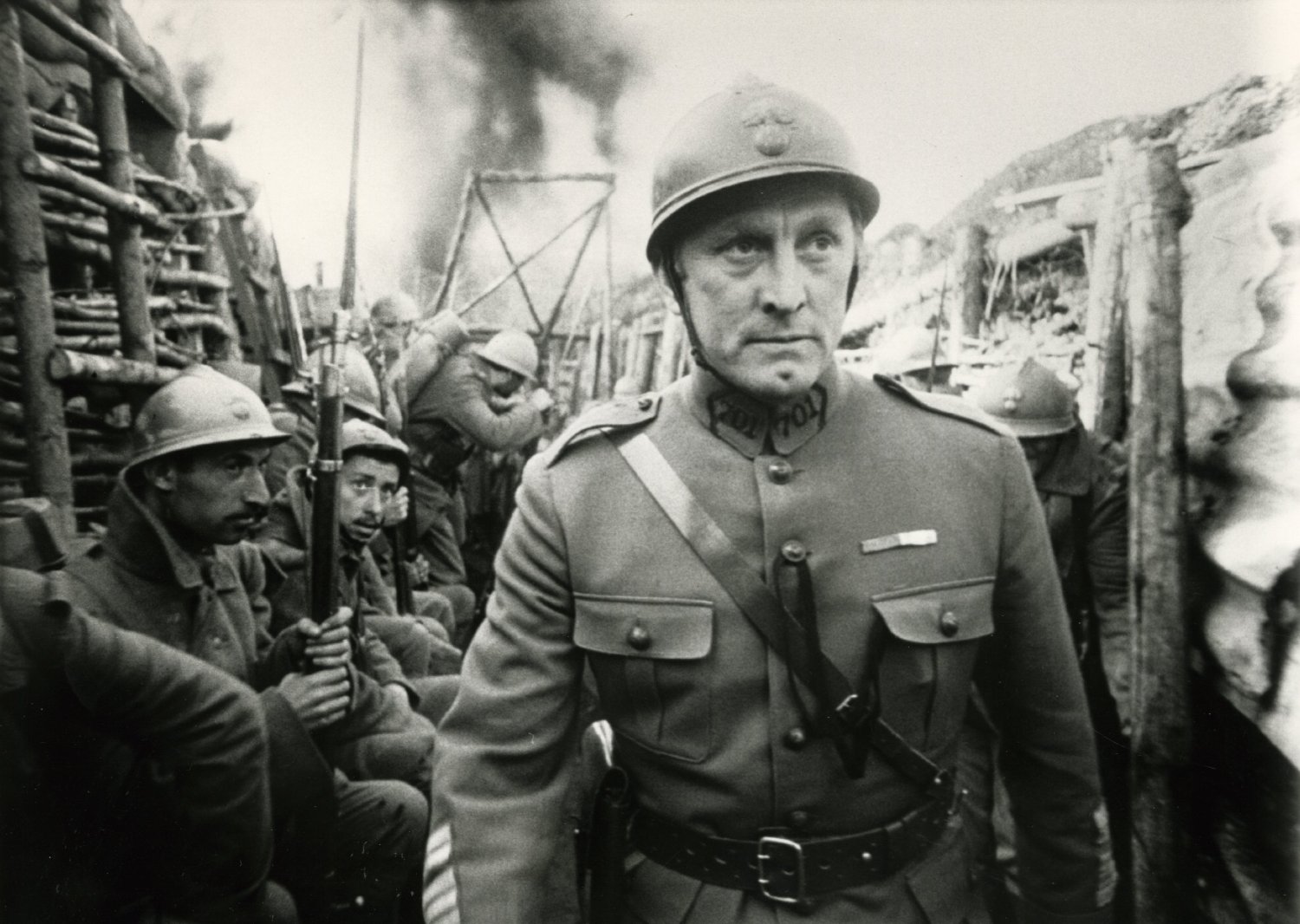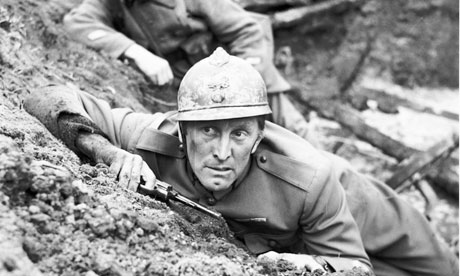 #330- Paths of Glory (1957)
#330- Paths of Glory (1957)Starring: Kirk Douglas, Ralph Meeker, Adolphe Menjou
Directed by: Stanley Kubrick
Plot Summary: When a suicide mission is ordered from within the French Army during World War I, the attack is put in the hands of Colonel Dax, despite his beliefs that the attack will only weaken the French Army. When Dax leads the attack, the mission is a failure and many of the soldiers retreat. In an attempt to deflect the blame from reaching him, General Mireau orders for 100 soldiers to be tried for cowardice. As a compromise for the numbers seeming too big, it is decided instead that a man from each company is picked to stand trial, reducing the numbers to only 3 men. Colonel Dax, who was a criminal defense lawyer outside the war, volunteers to defend these three men, knowing that each of them are unfairly accused and tries his hardest to win them their innocence and the chance to continue living.
When you talk about revolutionary filmmakers, one name that usually appears at the top is Stanley Kubrick. Considered one of the greatest directors of all-time, Kubrick had a method of filmmaking that was unlike anything proceeding him, and has since then been unable to replicate in the modern days of film. Not to mention he loved to tell stories that stretched to a variety of different genres. He's made war movies, satires, horror films, historical movies, and science fiction films. Let's begin looking at this legendary career of film by looking at one of his earliest masterpieces, Paths of Glory. Of his early days of directing, Paths of Glory is the one that really put his name on the radar thanks to its World War I setting, its anti-war themes, and the star power of its leading man. It really allowed the door to be opened for Kubrick for future projects, and the rest (as they say) is history.
 Kirk Douglas stars as Colonel Dax, in one of Douglas's most memorable roles on film. Douglas as Dax is the definition of a powerful performance. His monologues command the screen, his words are always to the point, and he is even able to show some compassion towards his fellow soldiers. It's the human elements of Dax that serve as one of the film's biggest themes. When other characters are so dehumanizing, Dax serves as a refreshing take on what a war Colonel was normally NOT portrayed as. Everyone has an idea in their mind of a stereotypical army character (and we will get to that stereotype further when we get to Full Metal Jacket), so when Douglas plays Dax as something different, it's completely unexpected and appreciated. I know Douglas did at least one other film with Kubrick (a pretty important film for his career in fact), and add that with how much I loved him in Gunfight at the O.K. Corral and we have the makings of one of my all-time favorite actors (right up there with Tom Hanks and James Stewart).
Kirk Douglas stars as Colonel Dax, in one of Douglas's most memorable roles on film. Douglas as Dax is the definition of a powerful performance. His monologues command the screen, his words are always to the point, and he is even able to show some compassion towards his fellow soldiers. It's the human elements of Dax that serve as one of the film's biggest themes. When other characters are so dehumanizing, Dax serves as a refreshing take on what a war Colonel was normally NOT portrayed as. Everyone has an idea in their mind of a stereotypical army character (and we will get to that stereotype further when we get to Full Metal Jacket), so when Douglas plays Dax as something different, it's completely unexpected and appreciated. I know Douglas did at least one other film with Kubrick (a pretty important film for his career in fact), and add that with how much I loved him in Gunfight at the O.K. Corral and we have the makings of one of my all-time favorite actors (right up there with Tom Hanks and James Stewart).Let's briefly discuss a trio of authority figures that serve as antagonists for the film. I say briefly because what you see with these characters is what you get. Lieutenant Roget, played by Wayne Morris, is an absolute coward. General Mireau, played by George Macready, is emotionless and thirsty for blood and violence. And Major General Broulard, played by Adolphe Menjou, is a master manipulator, trying his best to cater to as many characters' loyalties in order to get what he wants out of them. Just cause these characters are by the books doesn't mean they aren't well-performed. All three have traits that get under your skin and loathe them as much as the main characters do.
Thanks to the underhanded actions of the authority (a phrase which reminds me of my wrestling blog), a trio of victims are tried for treason and cowardice on the war front. The most empathetic is definitely Corporal Paris, played by Ralph Meeker, who is accused by Roget in a cover up for his own cowardice. Paris was just that guy who was in the wrong place at the wrong time and now his life is held in the balance of a trial hearing. The other two have their moments as well. Private Arnaud, played by Joe Turkel, is a character that was thrown into the lot despite being honored for bravery twice. He's a decorated soldier who has been given a serious raw deal, and even goes as far as to deny religion and the priest who visits them in prison. The final member is Private Ferol, played by Timothy Carey, a taller fellow deemed "socially unacceptable." He puts up a really strong front at first, but as their judgment day draws nearer, he begins to cry like a baby. We really get to know these three and we pray for them to be found, an excellent example of how all soldiers are men with lives and emotions, not just expendable drones at the army's disposal (I really hope I don't offend anybody with that one...).
Paths of Glory has been referred to by many film scholars as one of the greatest anti-war movies ever made. You really have to think about when this film was released. During the previous war, films came out as propaganda to glorify the war effort and restore patriotism in their respective countries. In this film, it takes an entirely different approach and shows that war is not as amazing as it was built up as. In fact, most of the time taking place during the war isn't detailing a battle between opposing sides (even though there is a spectacular battle scene), but rather much of the focus is between men who are supposed to be on the same side. There is so much manipulation and betrayal between the main characters that it's really disheartening for anyone who thinks military life is automatically this great brotherhood or family environment. Like I said earlier, Dax is one of the only characters to show compassion for his fellow men, so it is achievable to some extent, but this film shows it is easier said than done. This probably opened a LOT of eyes at the time, and in fact, it was banned in certain countries due to its anti-war themes (an early display of controversies surrounding Kubrick's films).
 I discovered that Kubrick's movies are the kind that you should own on DVD for the Bonus Features. Even if you can enjoy the movie on its own, it really pays off to watch the Bonus Features since they unlock some of Kubrick's brilliance behind the scenes. A good example in Paths of Glory was Kubrick's use of multiple takes (a popular trope he used in nearly all of his projects). This man was the epitome of meticulous and wanted to make sure every shot, every line delivered, every scene on film was there for a reason: because it was perfection. It was said by a colleague of his on the Paths of Glory Blu-ray that Kubrick feared mediocrity, and I believe it is his passion to make sure everything in his films have a purpose that cements his legendary career as a director. When you take your films THAT seriously, there can only be success right? Well, maybe not at first at the box office (with Paths of Glory achieving moderate financial success), but they are appreciated throughout history by movie buffs everywhere, and this film is no exception.
I discovered that Kubrick's movies are the kind that you should own on DVD for the Bonus Features. Even if you can enjoy the movie on its own, it really pays off to watch the Bonus Features since they unlock some of Kubrick's brilliance behind the scenes. A good example in Paths of Glory was Kubrick's use of multiple takes (a popular trope he used in nearly all of his projects). This man was the epitome of meticulous and wanted to make sure every shot, every line delivered, every scene on film was there for a reason: because it was perfection. It was said by a colleague of his on the Paths of Glory Blu-ray that Kubrick feared mediocrity, and I believe it is his passion to make sure everything in his films have a purpose that cements his legendary career as a director. When you take your films THAT seriously, there can only be success right? Well, maybe not at first at the box office (with Paths of Glory achieving moderate financial success), but they are appreciated throughout history by movie buffs everywhere, and this film is no exception.Rating: 4 out of 5 stars
What I expected to be a small taste of Kubrick's career proved to be an early contender for one of his best projects. The characters and anti-war themes are compelling and Kirk Douglas captivates the screen as Colonel Dax. If you love Kubrick or war movies, Paths of Glory is definitely worth owning in your collection (particularly the Criterion Collection Blu-ray). And if you're the casual moviegoer, this is one is still worth a weekend rental.
Paths of Glory and movie images are copyrighted by United Artists
No comments:
Post a Comment